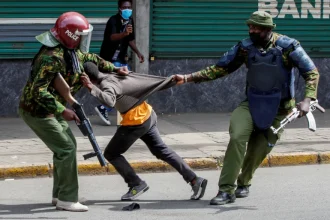By: Simiyu Stanford
In recent years, Kenya has experienced a concerning pattern in the administration of state security: the withdrawal of protection from key public figures at moments of heightened political or institutional tension. Though the National Police Service (NPS) retains legal authority over the deployment of officers, the way this authority is exercised has significant implications for public trust, governance and constitutional order.
The withdrawal of security from Governor George Natembeya, closely followed by similar actions against Senator Boni Khalwale, attracted national attention not only because of the individuals involved but because of the timing. Both politicians had, in the period preceding these decisions, adopted firm positions at odds with the administration’s preferred direction. Earlier in the year, the reduction of security around Chief Justice Martha Koome raised even deeper institutional concerns, given the office she occupies and the constitutional safeguards intended to protect judicial independence.
These incidents, taken together, form a pattern that must be taken seriously.
Security and the Responsibilities of the State
The provision of security to public officials is not a privilege, it is an obligation tied to their roles, the risks inherent to their work and the stability of national institutions. When this protection is withdrawn, especially without transparent explanation, several risks emerge:
- Personal Safety Risks: Public officials who command significant attention, exercise oversight, or challenge powerful interests face real threats. The state cannot ignore this reality.
- Institutional Risks: For officeholders like the Chief Justice, security is not merely personal, it protects the independence of the Judiciary. Undermining this protection sends a troubling message about how the Executive relates to co-equal arms of government.
- Public Confidence: Citizens assess the fairness of government actions not only by what is said, but by what is done. When security withdrawal appears selective or reactive, it erodes confidence in state neutrality.
Political Context Cannot Be Ignored
Although the government has explained some of these withdrawals as routine administrative reassignments or precautionary measures linked to intelligence reports, these justifications must be scrutinized in context.
The timing has frequently coincided with: moments of political contestation, disagreements between state actors or public criticism directed at the Executive.
In political analysis, patterns of timing are often as significant as the actions themselves. Where withdrawals align with dissent, the perception, fair or not, is that security has become a tool for disciplining critics rather than a neutral instrument of public protection.
Perception matters in governance. It shapes trust, legitimacy, and the degree to which institutions are viewed as impartial.
Legal Authority vs. Democratic Norms
One may distinguish between what is legally permissible and what is democratically prudent. Legally, the NPS may reassign officers. Democratically, such decisions should follow transparent criteria, be communicated clearly, and avoid any appearance of retaliation.
A constitutional democracy depends not only on the letter of the law but on adherence to norms, restraint, fairness, and respect for institutional independence. When decisions fall short of these standards, even if technically lawful, they risk undermining the democratic fabric that supports the nation.
Even without explicit threats, the withdrawal of security can create an atmosphere in which public officers, politicians, and even independent institutions begin to self-censor or exercise undue caution. Governance thrives when leaders are able to speak and act without fear of personal vulnerability. A system that inadvertently or intentionally introduces such fear weakens its own democratic foundations.
The withdrawal of security from public figures is not a minor administrative matter. It is an action that touches on the safety of individuals, the autonomy of institutions, and the legitimacy of the state. Kenya must treat it with the seriousness it deserves.
A robust democracy ensures that protection is not influenced by political alignment, opinion, or institutional stance. If the country is to preserve the integrity of its constitutional order, security decisions must be transparent, fair, and insulated from political motivations.
About the Writer
The writer is a political analyst and a PhD student in Literature at Masinde Muliro University of Science and Technology (MMUST). He is also a literary scholar, blending political insight with humanistic analysis. His works include: The Ring of the Moon (2023) “A masterpiece to explore and achieve academic excellence in poetry.”, Robai Nabisino Makokha (2023) “The remarkable life of a distinguished woman.” And, Off Walls Unbroken and Other Stories (2025)-a collection portraying contemporary society through keen literary observation. His scholarship and analysis focus on the intersections of governance, culture and the narratives that shape public life.









